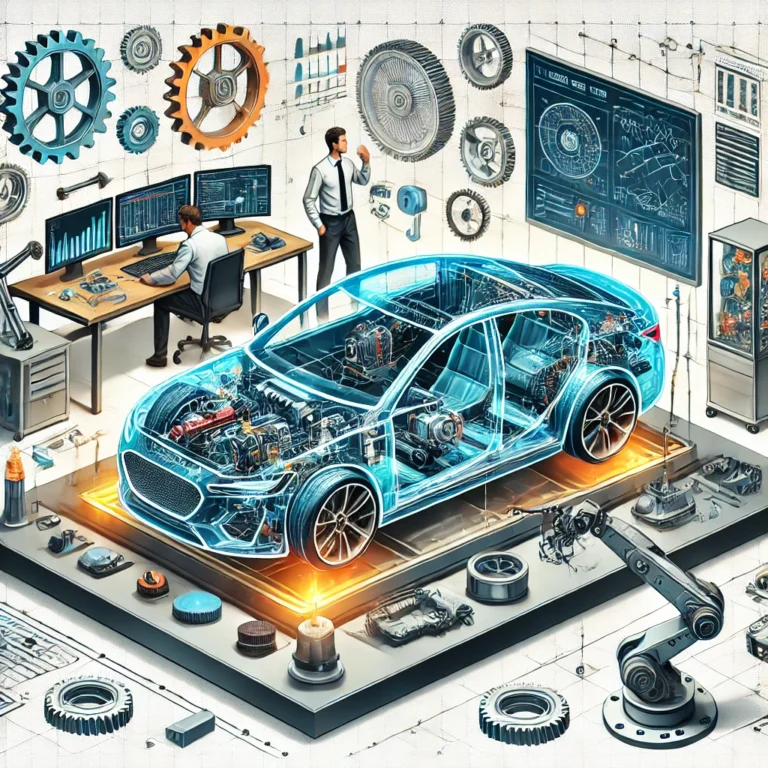What is Mechanical Engineering? A Detailed Explanation
Introduction:
Mechanical Engineering (ME) is one of the oldest and broadest branches of engineering. It combines principles of physics, mathematics, and material science to design, analyze, manufacture, and maintain mechanical systems. Mechanical engineers are responsible for creating and improving everything that moves, from small parts like gears to large systems like vehicles, airplanes, and industrial machinery. In simple terms, mechanical engineering involves understanding how forces and energy work to make machines, vehicles, tools, and systems function efficiently and safely.

Mechanical engineering plays a vital role in almost every industry, from automotive and aerospace to energy, manufacturing, and robotics. If you’ve ever wondered who designs cars, airplanes, industrial robots, heating systems, or even simple tools like scissors, the answer is mechanical engineers.
Key Areas of Mechanical Engineering
Mechanical engineering covers a wide range of topics and disciplines. Some of the core areas of focus include:
1. Mechanics
Mechanics is the branch of physics that deals with the motion of bodies and the forces acting upon them. In mechanical engineering, mechanics is used to understand how materials and structures behave under different forces, such as compression, tension, and shear. This understanding is crucial for designing safe and efficient machines.
- Statics: The study of forces on objects at rest. For example, how to ensure a bridge can support the weight of vehicles.
- Dynamics: The study of forces on moving objects. For example, how to design a car engine that optimally converts fuel into motion.
2. Thermodynamics
Thermodynamics is the study of heat, energy, and their transformations. It is a key area of mechanical engineering because many mechanical systems (engines, refrigerators, power plants) rely on the conversion of heat into energy.
Mechanical engineers use the laws of thermodynamics to improve the efficiency of systems, such as designing engines that use less fuel to produce more power, or designing HVAC (heating, ventilation, and air conditioning) systems that save energy.
The four laws of thermodynamics govern how energy behaves, helping engineers develop technologies that can generate, use, and conserve energy effectively.
3. Materials Science
Materials science involves studying the properties of materials and how they perform under different conditions. Mechanical engineers need to understand the behavior of metals, plastics, composites, and ceramics to select the best materials for a given design.
For instance, materials used in car engines must withstand high temperatures and stress, while materials for medical devices need to be biocompatible and lightweight. The study of material properties, including strength, elasticity, and durability, is essential for designing safe and reliable products.
4. Fluid Mechanics
Fluid mechanics is the study of fluids (liquids and gases) and how they behave when they are at rest or in motion. In mechanical engineering, it plays a critical role in designing systems such as pumps, turbines, heating and cooling systems, and even airplanes.
Engineers use fluid mechanics to optimize air and water flow in various systems. For example, in aircraft design, they ensure that the flow of air over the wings is optimized for lift, while in piping systems, they focus on minimizing friction to increase energy efficiency.
5. Manufacturing and Production
Mechanical engineers play a crucial role in designing and improving manufacturing processes. From the design of assembly lines to the development of new materials and tools, engineers work to make the production of goods faster, cheaper, and more efficient.
They also focus on quality control, ensuring that every product is made according to specifications, with minimal defects. Techniques like lean manufacturing, automation, and robotics are commonly used to improve efficiency in factories.
6. Mechatronics and Robotics
Mechatronics is a multidisciplinary area that combines mechanical engineering, electrical engineering, computer science, and control systems to design and create intelligent systems and robots. It is about integrating mechanical systems with electronic controls and computing power.
For instance, in robotics, mechanical engineers work on the physical design and movement of robots, while integrating sensors, actuators, and controllers to make them intelligent and autonomous. Mechatronics is widely used in industries such as manufacturing (robotic arms), healthcare (surgical robots), and entertainment (drones and autonomous vehicles).
7. Control Systems
Control systems engineering is concerned with designing systems that can maintain desired outputs despite varying input conditions. These systems are essential in applications like automatic cruise control in cars, heating systems, aircraft autopilot systems, and industrial machines.
Mechanical engineers use sensors, actuators, and feedback loops to design systems that respond to real-time changes in conditions, ensuring smooth and efficient operation.
Core Subjects in Mechanical Engineering
A mechanical engineering degree typically includes a broad range of subjects that equip students with the knowledge to work in various industries. Some core subjects include:
- Statics and Dynamics: Understanding forces, motion, and the behavior of structures and mechanical systems.
- Fluid Mechanics: Study of how fluids (liquids and gases) move and interact with solid objects.
- Thermodynamics: Exploring energy, heat, and work in mechanical systems.
- Material Science: Analyzing the properties and behaviors of materials used in manufacturing.
- Manufacturing Processes: Learning about techniques like machining, welding, and casting.
- Mechanical Vibrations: Understanding oscillations in mechanical systems, which is crucial for designing systems like car suspensions or aircraft wings.
- Control Systems: Understanding the design and implementation of automatic control systems.
- Engineering Design: The process of creating and testing prototypes for new products and systems.
The Importance of Mechanical Engineering
Mechanical engineering is everywhere and has a significant impact on our daily lives. The products and systems designed by mechanical engineers are used in nearly every aspect of society. Some of the most notable contributions of mechanical engineering include:
- Transportation: From cars, trucks, and buses to trains, airplanes, and ships, mechanical engineers design the systems that make transportation possible. Innovations in energy efficiency and safety are continuously improving the way we travel.
- Energy Systems: Mechanical engineers are central to the design of power plants, renewable energy systems (like wind turbines and solar panels), and energy-efficient appliances. Their work helps produce and conserve energy for homes, businesses, and industries.
- Manufacturing and Automation: Mechanical engineers are responsible for designing and improving the machines and systems that produce goods. They design everything from conveyor belts to robotic arms used in assembly lines.
- Consumer Products: Mechanical engineers design products like refrigerators, washing machines, and air conditioners, ensuring that they are reliable, efficient, and cost-effective.
- Robotics and AI: Mechanical engineers contribute to the development of robots that can perform tasks like assembling cars, exploring other planets, or assisting with medical surgeries.
- Aerospace: The design of aircraft and spacecraft requires a combination of fluid dynamics, thermodynamics, and materials science to create lightweight, efficient, and reliable machines.
Career Opportunities in Mechanical Engineering
Mechanical engineering offers a wide range of career opportunities. Some of the sectors that employ mechanical engineers include:
- Automotive: Designing cars, trucks, and motorcycles.
- Aerospace: Working on the design of aircraft, spacecraft, and drones.
- Energy: Designing power plants, renewable energy systems, and energy-efficient technologies.
- Manufacturing: Improving production processes and automation.
- Robotics and Mechatronics: Designing and building robots for industries like healthcare and manufacturing.
- Consulting and Research: Working for companies or research institutes to develop new technologies or improve existing systems.
Conclusion
Mechanical engineering is a diverse and exciting field that is central to the development of nearly every modern technology. It combines theoretical knowledge with practical skills to create systems and machines that solve real-world problems. Whether it’s designing cars, airplanes, energy-efficient buildings, or robots, mechanical engineers are at the heart of innovation. The field offers a wide range of career opportunities and the chance to work on projects that have a profound impact on society and the environment.











